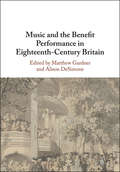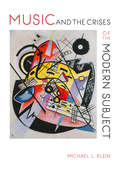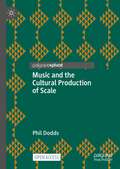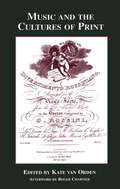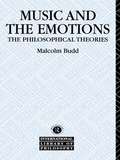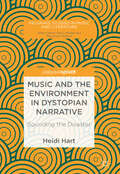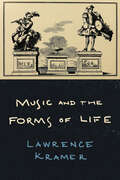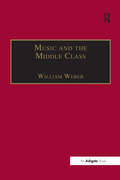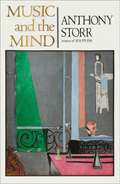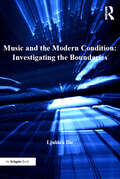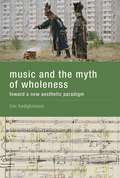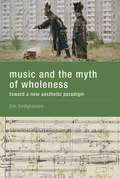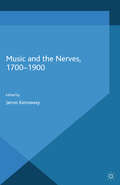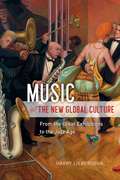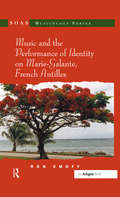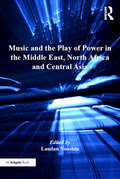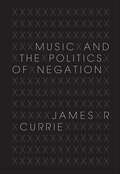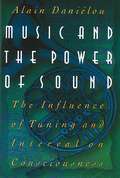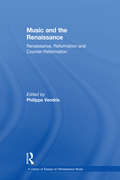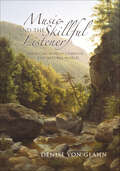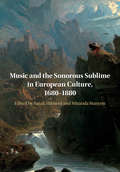- Table View
- List View
Music and the Benefit Performance in Eighteenth-Century Britain
by Matthew Gardner Alison Clark DeSimoneIn the early eighteenth century, the benefit performance became an essential component of commercial music-making in Britain. Benefits, adapted from the spoken theatre, provided a new model from which instrumentalists, singers, and composers could reap financial and professional rewards. Benefits could be given as theatre pieces, concerts, or opera performances for the benefit of individual performers; or in aid of specific organizations. The benefit changed Britain's musico-theatrical landscape during this time and these special performances became a prototype for similar types of events in other European and American cities. Indeed, the charity benefit became a musical phenomenon in its own right, leading, for example, to the lasting success of Handel's Messiah. By examining benefits from a musical perspective - including performers, audiences, and institutions - the twelve chapters in this collection present the first study of the various ways in which music became associated with the benefit system in eighteenth-century Britain.
Music and the Cognitive Sciences 1990 (Contemporary Music Review)
by Ian Cross Irene DeliegeThis issue comprises the twenty-five papers presented at the Second Music and the Cognitive Sciences conference held at Cambridge University in 1990.
Music and the Crises of the Modern Subject
by Michael L. KleinDeparting from the traditional German school of music theorists, Michael Klein injects a unique French critical theory perspective into the framework of music and meaning. Using primarily Lacanian notions of the symptom, that unnamable jouissance located in the unconscious, and the registers of subjectivity (the Imaginary, the Symbolic Order, and the Real), Klein explores how we understand music as both an artistic form created by "the subject" and an artistic expression of a culture that imposes its history on this modern subject. By creatively navigating from critical theory to music, film, fiction, and back to music, Klein distills the kinds of meaning that we have been missing when we perform, listen to, think about, and write about music without the insights of Lacan and others into formulations of modern subjectivity.
Music and the Cultural Production of Scale
by Phil DoddsThis open access book studies various ways popular music produces relations of geographic scale. Scales are sets of spatial frames, abstractions or categories that denote the size, proportion, level, extent or hierarchical relations of phenomena. They are neither natural nor neutral but actively produced, with real political effects. But what role do cultural practices play in the production of scale? Phil Dodds addresses this question by focusing on music, arguing that music scholarship has both most to gain from and most to offer to a fuller conceptualisation of how geographical scale is culturally produced. Dodds suggests that music scholars should treat scales as open questions, and as phenomena potentially made through musical practices, rather than as stable categories for framing other arguments about, say, ‘local’ or ‘global’ music. He analyses how the meaning of ‘the local’ is affected by the aesthetics of popular music, and how the relationship between the particular and the general is fused through common musical conventions. Music and the Cultural Production of Scale explores diverse musical examples – including Janelle Monáe’s concept albums, key tracks in the grime genre, protest songs at environmental and anti-fascist demonstrations, and nineteenth-century colonial hymn-singing – to demonstrate how we already live in a world whose scales are made by music. The book also shows that music has the potential to produce a world scaled otherwise.
Music and the Cultures of Print (Critical and Cultural Musicology #Vol. 1)
by Kate Van Orden Roger ChartierThis collection of essays explores the cultures that coalesced around printed music in previous centuries. It focuses on the unique modes through which print organized the presentation of musical texts, the conception of written compositions, and the ways in which music was disseminated and performed. In highlighting the tensions that exist between musical print and performance this volume raises not only the question of how older scores can be read today, but also how music expressed its meanings to listeners in the past. First Published in 2000. Routledge is an imprint of Taylor & Francis, an informa company.
Music and the Emotions: The Philosophical Theories (International Library of Philosophy)
by Malcolm BuddIt has often been claimed, and frequently denied, that music derives some or all of its artistic value from the relation in which it stands to the emotions. This book presents and subjects to critical examination the chief theories about the relationship between the art of music and the emotions.
Music and the Environment in Dystopian Narrative: Sounding The Disaster (Palgrave Studies In Music And Literature Ser.)
by Heidi HartMusic and the Environment in Dystopian Narrative: Sounding the Disaster investigates the active role of music in film and fiction portraying climate crisis. From contemporary science fiction and environmental film to “Anthropocene opera,” the most arresting eco-narratives draw less on background music than on the power of sound to move fictional action and those who receive it. Beginning with a reflection on a Mozart recording on the 1970s’ Voyager Golden Record, this book explores links between music and violence in Lidia Yuknavitch’s 2017 novel The Book of Joan, songless speech in the opera Persephone in the Late Anthropocene, interrupted lyricism in the eco-documentary Expedition to the End of the World, and dread-inducing hurricane music in the Brecht-Weill opera Rise and Fall of the City of Mahagonny. In all of these works, music allows for a state of critical vulnerability in its hearers, communicating planetary crisis in an embodied way.
Music and the Exotic from the Renaissance to Mozart
by Ralph P. LockeDuring the years 1500–1800, European performing arts reveled in a kaleidoscope of Otherness: Middle-Eastern harem women, fortune-telling Spanish 'Gypsies', Incan priests, Barbary pirates, moresca dancers, and more. In this prequel to his 2009 book Musical Exoticism, Ralph P. Locke explores how exotic locales and their inhabitants were characterized in musical genres ranging from instrumental pieces and popular songs to oratorios, ballets, and operas. Locke's study offers new insights into much-loved masterworks by composers such as Cavalli, Lully, Purcell, Rameau, Handel, Vivaldi, Gluck, and Mozart. In these works, evocations of ethnic and cultural Otherness often mingle attraction with envy or fear, and some pieces were understood at the time as commenting on conditions in Europe itself. Locke's accessible study, which includes numerous musical examples and rare illustrations, will be of interest to anyone who is intrigued by the relationship between music and cultural history and by the challenges of cross-cultural (mis)understanding.
Music and the Forms of Life
by Lawrence KramerInventors in the age of the Enlightenment created lifelike androids capable of playing music on real instruments. Music and the Forms of Life examines the link between such simulated life and music, which began in the era's scientific literature and extended into a series of famous musical works by Haydn, Mozart, and Beethoven. Music invented auditory metaphors for the scientific elements of life (drive, pulse, sensibility, irritability, even metabolism), investigated the affinities and antagonisms between life and mechanism, and explored questions of whether and how mechanisms can come to life. The resulting changes in the conceptions of both life and music had wide cultural resonance at the time, and those concepts continued to evolve long after. A critical part of that evolution was a nineteenth-century shift in focus from moving androids to the projection of life in motion, culminating in the invention of cinema. Weaving together cultural and musical practices, Lawrence Kramer traces these developments through a collection of case studies ranging from classical symphonies to modernist projections of waltzing specters by Mahler and Ravel to a novel linking Bach's Goldberg Variations to the genetic code.
Music and the Ineffable
by Vladimir JankélévitchThe classic work on the philosophy of music—now available in English to a new generation of readersVladimir Jankélévitch left behind a remarkable body of work steeped as much in philosophy as in music. His writings on moral quandaries reflect a lifelong devotion to music and performance, and, as a counterpoint, he wrote on music aesthetics and on modernist composers such as Fauré, Debussy, and Ravel. Music and the Ineffable brings together these two threads, the philosophical and the musical, as an extraordinary quintessence of his thought. Jankélévitch deals with classical issues in the philosophy of music, including metaphysics and ontology. These are a point of departure for a sustained examination and dismantling of the idea of musical hermeneutics in its conventional sense.Music, Jankélévitch argues, is not a hieroglyph, not a language or sign system; nor does it express emotions, depict landscapes or cultures, or narrate. On the other hand, music cannot be imprisoned within the icy, morbid notion of pure structure or autonomous discourse. Yet if musical works are not a cipher awaiting the decoder, music is nonetheless entwined with human experience, and with the physical, material reality of music in performance. Music is "ineffable," as Jankélévitch puts it, because it cannot be pinned down, and has a capacity to engender limitless resonance in several domains. Jankélévitch's singular work on music was central to such figures as Roland Barthes and Catherine Clément, and the complex textures and rhythms of his lyrical prose sound a unique note, until recently seldom heard outside the francophone world.
Music and the Making of Portugal and Spain: Nationalism and Identity Politics in the Iberian Peninsula
by Ricardo Andrade Cristina Sánchez-Carretero Igor Contreras Zubillaga Héctor Fouce Eva Moreda Rodríguez Paulo Ferreira de Castro Vera Marques Alves Leonor Losa Pedro Moreira Hugo Castro Diego García-Peinazo Fernán Del Val Josep Martí Cristina Cruces RoldánHow music embodies and contributes to historical and contemporary nationalism What does music in Portugal and Spain reveal about the relationship between national and regional identity building? How do various actors use music to advance nationalism? How have state and international heritage regimes contributed to nationalist and regionalist projects? In this collection, contributors explore these and other essential questions from a range of interdisciplinary vantage points. The essays pay particular attention to the role played by the state in deciding what music represents Portuguese or Spanish identity. Case studies examine many aspects of the issue, including local recording networks, so-called national style in popular music, and music’s role in both political protest and heritage regimes. Topics include the ways the Salazar and Franco regimes adapted music to align with their ideological agendas; the twenty-first-century impact of UNESCO’s Intangible Cultural Heritage program on some of Portugal and Spain's expressive practices; and the tensions that arise between institutions and community in creating and recreating meanings and identity around music. Contributors: Ricardo Andrade, Vera Marques Alves, Salwa El-Shawan Castelo-Branco, Cristina Sánchez-Carretero, José Hugo Pires Castro, Paulo Ferreira de Castro, Fernán del Val, Héctor Fouce, Diego García-Peinazo, Leonor Losa, Josep Martí, Eva Moreda Rodríguez, Pedro Russo Moreira, Cristina Cruces Roldán, and Igor Contreras Zubillaga
Music and the Middle Class: The Social Structure of Concert Life in London, Paris and Vienna between 1830 and 1848 (Music In Nineteenth-century Britain Ser.)
by William WeberFirst published in 1975, Music and the Middle Class made a trail-blazing contribution to the social history of music, bringing together sociological and historical methods that have subsequently become accepted as central to the discipline of musicology. Moreover, the major themes of the book are ones which scholars today continue to grapple with: the nature of the middle class(es) and their role in cultural definition; the concept of taste publics distinct from social status; and the establishment of the musical canon. This classic text is reissued here in Ashgate's Music in Nineteenth-Century Britain series, though of course the book ranges beyond its study of London to discuss in detail the contrasting concert life of Paris and Vienna. This edition features a substantial new preface which takes into account the significant work that has been done in this field since the book first appeared, and provides a unique opportunity to assess the impact the book has had on our thinking about the European middle class and its role in musical life.
Music and the Mind
by Anthony StorrWhy does music have such a powerful effect on our minds and bodies? It is the most mysterious and most intangible of all forms of art. Yet, Anthony Storr believes, music today is a deeply significant experience for a greater number of people than ever before. In this challenging book, he explores why this should be so. Music is a succession of tones through time. How can a sequence of sounds both express emotion and evoke it in the listener? Drawing on a wide variety of opinions, Storr argues that the patterns of music make sense of our inner experience, giving both structure and coherence to our feelings and emotions. Dr. Storr was a practicing psychiatrist for nearly forty years and is a distinguished thinker about the sources of creativity. He is deeply concerned with the psychology of the creative process and with the healing power of the arts. Here he explains how, in a culture which requires us in our daily working lives to separate rational thought from feelings, music reunites the mind and body, restoring our sense of personal wholeness. It is because music possesses this capacity that many people, including the author, find it so life-enhancing that it justifies existence. Dr. Storr's investigation of music is also an exploration of the human psyche. That is why this book, like all his work, deepens our understanding of ourselves and the lives we lead.
Music and the Modern Condition: Investigating The Boundaries
by Ljubica IlicTwo crucial moments in the formation and disintegration of musical modernity and the musical canon occurred at the turn of the seventeenth and the first half of the twentieth century. Dr Ljubica Ilic provides a fresh and close look at these moments, exploring the ways musical compositions shift to and away from ideological structures identified with modernity. The focus is on European art music whose grand narrative, defined by tonality and teleological development, begins in the seventeenth century and ends with twentieth-century modernisms. This particular musical "language game" coincides with historical changes in the phenomenological understanding of space and selfhood. A key concept of the book concerns musical compositions that remain without proper conclusions: if the wholesome (musical) work is a manifestation of wholesome subjectivity, the pieces Ilic explores deny it, reflecting conflict of the individual with previous beliefs, with contexts, and even within the self as the basic modern condition. The musical work is, in this case, still bounded and well-defined, but fractured by the incapability or refusal to satisfactorily conclude: the implicit cut forced upon it changes the expected musical flow or - speaking in spatial terms - it influences the musical form. By using the metaphor of space, Ilic explores: how the existence of a separate self as a primary feature of Western modernity becomes negotiated through awareness of the subject's own independence and individuality; innerness as something entirely separate from its surroundings; and the collective space of social interaction. Seeing musical storytelling as a metaphoric representation of selfhood, and modernity as a historical continuum, Ilic examines the boundaries and relationships between the musical work, the subject, and modern European history.
Music and the Myth of Wholeness
by Tim HodgkinsonIn this book, Tim Hodgkinson proposes a theory of aesthetics and music grounded in the boundary between nature and culture within the human being. His analysis discards the conventional idea of the human being as an integrated whole in favor of a rich and complex field in which incompatible kinds of information -- biological and cultural -- collide. It is only when we acknowledge the clash of body and language within human identity that we can understand how art brings forth the special form of subjectivity potentially present in aesthetic experiences.As a young musician, Hodgkinson realized that music was, in some mysterious way, "of itself" -- not isolated from life, but not entirely continuous with it, either. Drawing on his experiences as a musician, composer, and anthropologist, Hodgkinson shows how when we listen to music a new subjectivity comes to life in ourselves. The normal mode of agency is suspended, and the subjectivity inscribed in the music comes toward us as a formative "other" to engage with. But this is not our reproduction of the composer's own subjectivation; when we perform our listening of the music, we are sharing the formative risks taken by its maker. To examine this in practice, Hodgkinson looks at the work of three composers who have each claimed to stimulate a new way of listening: Pierre Schaeffer, John Cage, and Helmut Lachenmann.
Music and the Myth of Wholeness: Toward a New Aesthetic Paradigm
by Tim HodgkinsonA new theory of aesthetics and music, grounded in the collision between language and the body. In this book, Tim Hodgkinson proposes a theory of aesthetics and music grounded in the boundary between nature and culture within the human being. His analysis discards the conventional idea of the human being as an integrated whole in favor of a rich and complex field in which incompatible kinds of information—biological and cultural—collide. It is only when we acknowledge the clash of body and language within human identity that we can understand how art brings forth the special form of subjectivity potentially present in aesthetic experiences.As a young musician, Hodgkinson realized that music was, in some mysterious way, “of itself”—not isolated from life, but not entirely continuous with it, either. Drawing on his experiences as a musician, composer, and anthropologist, Hodgkinson shows how when we listen to music a new subjectivity comes to life in ourselves. The normal mode of agency is suspended, and the subjectivity inscribed in the music comes toward us as a formative “other” to engage with. But this is not our reproduction of the composer's own subjectivation; when we perform our listening of the music, we are sharing the formative risks taken by its maker. To examine this in practice, Hodgkinson looks at the work of three composers who have each claimed to stimulate a new way of listening: Pierre Schaeffer, John Cage, and Helmut Lachenmann.
Music and the Nerves, 1700-1900
by James KennawayThe relationship between music and the nervous system is now the subject of intense interest for scientists and people in the humanities, but this is by no means a new phenomenon. This volume sets out the history of the relationship between neurology and music, putting the advances of our era into context.
Music and the New Global Culture: From the Great Exhibitions to the Jazz Age (Big Issues in Music)
by Harry LiebersohnMusic listeners today can effortlessly flip from K-pop to Ravi Shankar to Amadou & Mariam with a few quick clicks of a mouse. While contemporary globalized musical culture has become ubiquitous and unremarkable, its fascinating origins long predate the internet era. In Music and the New Global Culture, Harry Liebersohn traces the origins of global music to a handful of critical transformations that took place between the mid-nineteenth and early twentieth century. In Britain, the arts and crafts movement inspired a fascination with non-Western music; Germany fostered a scholarly approach to global musical comparison, creating the field we now call ethnomusicology; and the United States provided the technological foundation for the dissemination of a diverse spectrum of musical cultures by launching the phonograph industry. This is not just a story of Western innovation, however: Liebersohn shows musical responses to globalization in diverse areas that include the major metropolises of India and China and remote settlements in South America and the Arctic. By tracing this long history of world music, Liebersohn shows how global movement has forever changed how we hear music—and indeed, how we feel about the world around us.
Music and the Performance of Identity on Marie-Galante, French Antilles (Soas Studies In Music Ser.)
by Ron EmoffMarie-Galante is a small island situated in the Caribbean to the south of Guadeloupe. The majority of Marie-Galantais are descendants of the slave era, though a few French settlers also occupy the island. Along with its neighbours Guadeloupe and Martinique, Marie-Galante forms an official d�rtement of France. Marie-Galante historically has never been an independent polity. Marie-Galantais express sentiments of being 'deux fois colonis or twice colonized, concomitant with their sense of insularity from a global organization of place. Dr Ron Emoff translates this pervasive sense of displacement into the concept of the 'non-nation'. Musical practices on the island provide Marie-Galantais with a means of re-connecting with other significant distant places. Many Marie-Galantais display a 'split-subjectivity', embracing an African heritage, a French association and a Caribbean regionalism. This book is unique, in part, with regard to its treatment of a particular mode of self-consciousness, expressed musically, on a virtually forgotten Caribbean island. The book also combines literary, narrative, historical and musical sources to theorize a postcolonial subsurreal in the French Antilles. The focus of the book is upon kadril dance and gwo ka drumming, two prevalent musical practices on the island with which Marie-Galantais construct unique perceptions of self in relation, specifically, to Africa and France. Based on several extended periods of ethnographic research, the book evokes unique Marie-Galantais views on tradition, historicity, esclavage, nationalism (and its absence) and the local significance of occupying a globally out-of-the-way place. The book will be of interest not only to ethnomusicologists, but also to those interested in cultural and linguistic anthropology, postcolonial studies, performance studies, folklore and Caribbean studies.
Music and the Play of Power in the Middle East, North Africa and Central Asia (SOAS Studies in Music Series)
by Laudan NooshinWhat is it about the history, geographical position and cultures of the Middle East, North Africa and Central Asia that has made music such a potent and powerful agent? This volume presents the first direct look at the complex relationship between music and power across a range of musical genres and countries. Discourses of power in the region centre on some of the most contested social issues, most notably in relation to nationhood, gender and religion. Individual chapters examine the ways in which music serves as a forum for playing out issues of power, ideology, resistance and subversion. How does music become a space for promoting - or conversely, resisting or subverting - particular ideologies or positions of authority? How does it accrue symbolic power in ways that are very particular, perhaps unique? And how does music become a site of social control or, alternatively, a vehicle for agency and empowerment, at times overt and at others highly subtle? What is it about music that facilitates, and sometimes disrupts, the exercise and flows of power? Who controls such flows, how and for what purposes? In asking such questions in the context of countries such as Afghanistan, Egypt, Iran, Tunisia and Tajikistan, the book draws on a wide range of relevant theoretical and critical ideas, and many disciplines including ethnomusicology, anthropology, sociology, politics, Middle Eastern studies, globalization studies, gender studies and cultural and media studies. The countries and areas explored share a great deal in historical and cultural terms, including a legacy of colonial and neo-colonial encounters and predominantly Judeo-Muslim religious traditions. It is hoped that the volume will contribute ultimately to a richer understanding of the role that music plays in these societies.
Music and the Politics of Negation (Musical Meaning and Interpretation)
by James R. CurrieOver the past quarter century, music studies in the academy have their postmodern credentials by insisting that our scholarly engagements start and end by placing music firmly within its various historical and social contexts. In Music and the Politics of Negation, James R. Currie sets out to disturb the validity of this now quite orthodox claim. Alternating dialectically between analytic and historical investigations into the late 18th century and the present, he poses a set of uncomfortable questions regarding the limits and complicities of the values that the academy keeps in circulation by means of its musical encounters. His overriding thesis is that the forces that have formed us are not our fate.
Music and the Power of Sound: The Influence of Tuning and Interval on Consciousness
by Alain DaniélouMusic has always been esteemed for its power to speak directly to our higher consciousness, a power founded in the purity of simple harmonic ratios. In this book, Alain Danielou traces the development of musical scales and tuning from their origins in both China and India, through their merging in ancient Greece, and on to the development of the Western traditions of modal and polyphonic music. Understanding these potent harmonic relationships offers a way for today's musicians to transcend the limitations of overly rationalistic music by drawing on its metaphysical roots.
Music and the Renaissance: Renaissance, Reformation and Counter-Reformation (A\library Of Essays On Renaissance Music Ser.)
by Philippe VendrixThis volume unites a collection of articles which illustrate brilliantly the complexity of European cultural history in the Renaissance. On the one hand, scholars of this period were inspired by classical narratives on the sublime effects of music and, on the other hand, were affected by the profound religious upheavals which destroyed the unity of Western Christianity and, in so doing, opened up new avenues in the world of music. These articles offer as broad a vision as possible of the ways of thinking about music which developed in the fifteenth and sixteenth centuries.
Music and the Skillful Listener: American Women Compose the Natural World (Music, Nature, Place)
by Denise Von GlahnFor Denise Von Glahn, listening is that special quality afforded women who have been fettered for generations by the maxim "be seen and not heard." In Music and the Skillful Listener, Von Glahn explores the relationship between listening and musical composition focusing on nine American women composers inspired by the sounds of the natural world: Amy Beach, Marion Bauer, Louise Talma, Pauline Oliveros, Joan Tower, Ellen Taaffe Zwilich, Victoria Bond, Libby Larsen, and Emily Doolittle. Von Glahn situates "nature composing" among the larger tradition of nature writing and argues that, like their literary sisters, works of these women express deeply held spiritual and aesthetic beliefs about nature. Drawing on a wealth of archival and original source material, Von Glahn skillfully employs literary and gender studies, ecocriticism and ecomusicology, and the larger world of contemporary musicological thought to tell the stories of nine women composers who seek to understand nature through music.
Music and the Sonorous Sublime in European Culture, 1680–1880
by Sarah Hibberd Miranda StanyonThe sublime - that elusive encounter with overwhelming height, power or limits - has been associated with music from the early-modern rise of interest in the Longinian sublime to its saturation of European culture in the later nineteenth century and beyond. This volume offers a historically situated study of the relationship between music, sound and the sublime. Together, the authors distinguish between the different aesthetics of production, representation and effect, while understanding these as often mutually reinforcing approaches. They demonstrate music's strength in playing out the sublime as transfer, transport and transmission of power, allied to the persistent theme of destruction, deaths and endings. The volume opens up two avenues for further research suggested by the adjective 'sonorous': a wider spectrum of sounds heard as sublime, and (especially for those outside musicology) a more multifaceted idea of music as a cultural practice that shares boundaries with other sounding phenomena.
